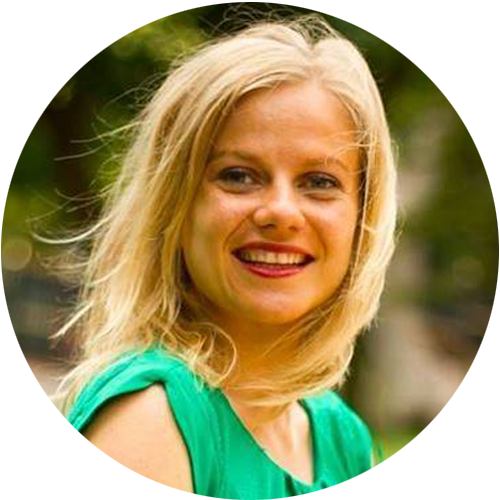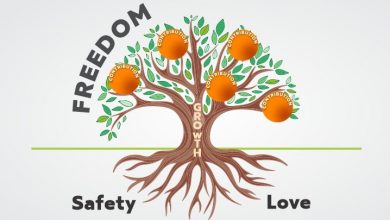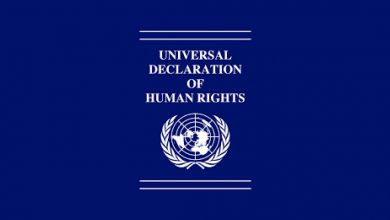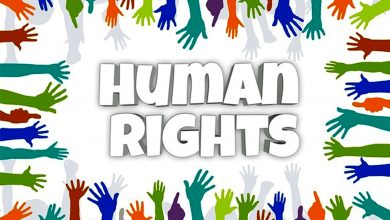How to win the fight against extremism
How can we eliminate extremism, and other forms of bigotry, racism, hatred and violence? What causes someone to be recruited into such destructive causes in the first place? What is lacking in mainstream societies that is making such pursuits appealing to young people all over the world? Why would someone attach themselves to these subcultures and build their sense of self and identity around it? This article aims to answer some of these questions, and perhaps raise more, for those who want to be a part of creating societies that are genuinely inclusive, peaceful and where everyone is truly equal.

Why did I choose this tool? While there is a lot of talk about extremism and how to fight against it, there is less discussion about why more and more people are turning to it in the first place and how it can be prevented from its root cause rather than by fighting off the symptoms.
How does this apply to being a trainer? It is normal as people, and as trainers, to think about and address issues from our own perspective, our own experiences and what we believe to be true. In order to increase our effectiveness as trainers, especially if we are tackling issues like extremism, racism, violence or hatred, it’s essential to put ourselves in the shoes of the people we are trying to reach and to understand on a deeper level what drives them even in a direction that seems strange or illogical to us. Only then we stand a chance at being able to influence them positively or prevent them from going in a direction that would be hurtful to themselves and others.
Main content:
“In medieval societies allegiances and identity were primarily defined by religion. Then we moved on to an era in the 19th century, with the rise of a European nation state, when identities and allegiances were defined by ethnicity, and the nation state reflected that. In the age of globalization, we moved on. I call it the era of citizenship, where people could be from multiracial multiethnic backgrounds but all be equal as citizens in a state. You could be American Italian, you could be American Irish, you could be British Pakistani. But I believe we are moving into a new age, an age that the New York times has defined as the age of behavior.
Age of Behavior – A period of transnational ideas and narratives affecting allegiances and behavior. These ideas and narratives that are transferred to and from people across borders are increasingly beginning to affect the way in which people behave.” TED talk by Maajid Nawaz: A global culture to fight extremism
This makes a lot of sense if you think about it. People are beginning to define themselves less by their country of nationality, their ethnicity or even their citizenship and more by what they do, their lifestyle choices and their values. And each choice and value that we identify with is accompanied by a narrative, a reason why that choice or value should be embraced.
What hasn’t changed, however, is the need to have an identity. The need to belong to a group, to share common goals and values. The need to be understood and to be validated. These are universal human needs, and they haven’t changed throughout history and they probably won’t change in the future. The only thing that is changing is the way that people are choosing to meet their needs, and what they are choosing to align themselves with. Instead of aligning ourselves with religion, we may be aligning ourselves with a cause. Instead of aligning ourselves with a nationality, we may be aligning ourselves with a lifestyle.
And it is these elements or the combination of these elements, that is forming what we consider to be our identity. Our identity is starting to be comprised of our life choices and the causes we choose to align ourselves with. And as Maajid Nawaz stated above, this can be either a blessing or a curse.
As trainers, this shift affects us in 2 ways. The first is that we cannot assume we understand someone by knowing their nationality, as they may have chosen an identity that has nothing to do with the “common characteristics” of their nationality. And the second is that if we want to promote intercultural understanding, human rights or other values we need to create as strong culture and narrative for them as those who are working tirelessly to promote values opposite to the ones we embrace.
Many people are under the illusion that if we fight against something hard enough it will cease to exist, when in reality “what you resist persists”. A much more effective way of fighting off something that we consider something bad is to replace it with something good. So instead of for example “fighting against extremism”, if we understood the reasons why someone might go towards extremism in the first place, and introduce something that can meet the needs that would otherwise be met with extremism, then we have a chance at success.
Every behavior is driven by an attempt to meet a need. There is no point in fighting against something without addressing the underlying need that behavior is trying to meet. And if we are indeed living in the age of behavior, we can begin to understand from the current patterns of behavior what the main needs are and how they are being met.
For example, we can hate extremism and want to fight against it. But more effectively we can think about:
What would make someone become an extremist?
What needs are they trying to fulfill that haven’t been met in any other way? (examples: belonging, purpose, clarity)
How can I be involved in fulfilling that need so that someone doesn’t have to turn to extremism to fulfill it? (example: create an organization that has a strong and appealing cause that can fulfill the need for belonging, purpose and clarity to those who get involved)
The following movie review for the film Layla M. (can be watched on Netflix) gives a powerful example of how someone with strong morals and ideals can end up turning towards extremism when they don’t feel accepted for who they are by the society that they are in, and the disastrous effects that it can bring to them and to the society.
Film review Layla M.
By Scott Tobias
With Islamophobia on the rise in Western Europe — evidenced by the “burqini” ban that recently scandalized the beaches of France — the timing couldn’t be better for “Layla M.,” an astute detailing of a Muslim woman’s radicalization in Amsterdam and beyond. Layla, a righteous firebrand of Moroccan descent, follows her ideals to the edge of the cliff. The director and actress work hard to complicate her journey, both internally and externally. They arrive at a plausible case study in terror recruitment, linked in no small part to Western policies of discrimination and harassment. But they also create a fully realized character whose passion has no home in a world dominated by men.
“Layla M.” may have special resonance in the Netherlands, a country plagued by ethnic and religious tension, but its feminist kick should be felt abroad, too. Surely many opinionated women will recognize themselves in Layla, a young woman who’s not afraid to mix it up a little. From the opening scene, where she argues a bad call against her father’s soccer team, Layla throws herself into volatile situations with the confidence of someone who knows what’s right — or at least thinks she knows what’s right. De Jong and her cinematographer, Danny Elsen, are wise to attach themselves to her hip, trusting that the audience will follow her charisma and abiding sense of justice to the darkest of places.
Though her middle-class father (Mohammed Azzay) and mother (Esma Abouzahra) urge her to focus on her promising academic ambitions, Layla finds herself drawn to the fringes of Islamic practice. Frustrated by her family’s apathy over a burqa ban and other threats to religious freedom, she devotes more of her time to studying the Quran, participating in demonstrations, and engaging with jihadists online and in covert gatherings. Her radicalization is like a vicious cycle: The further she goes, the more resistance she gets from her parents and the authorities, which inspires her to rebel all the more.
Not long after meeting Abdel (Ilias Addab), another young radical committed to the cause, Layla gets married, drops out of school, and travels with her husband to Amman, Jordan, where she hopes to lead a simple, austere life in line with Islamic teachings. What she finds, instead, is a severely patriarchal society that distances her from Abdel and violates her intrinsic need to have control over her own destiny.
De Jong could punish Layla for her naiveté as if she were just a social activist gone terribly amiss, but “Layla M.” is really about an idealist who’s trying to find a belief system worthy of her values. She doesn’t find it in Amsterdam, where Islam is treated with hostility and condescension, and she doesn’t find it in Amman, either, where her voice is cruelly stifled. Like many college radicals, Layla is searching for a community where she can live without compromise, and de Jong succeeds most in making sense of every decision that brings her down this wayward path.
As Layla and Abdel, El Koussour and Addab share gentle chemistry that curdles into romantic tragedy. “Layla M.” is never better than in the brief stretch where the newlyweds make their way from the Netherlands to Jordan, two lovers-on-the-lam who court danger, but also experience true moments of intimacy and joy. If de Jong were interested merely in the step-by-step process of creating a homegrown terrorist, “Layla M.” would play too much like a clunky polemic, with none of the spontaneity of real life. But in connecting with Layla’s innate goodness and her determination to find a system worthy of her values, the film laments the world that perverts them.
Reflection questions:
What do I want to fight against (extremism, hatred, bigotry, racism, abuse….)?
What are the underlying causes for the thing I’m fighting against?
What could be the unmet needs of the people who are embracing what I am fighting against (ex: belonging, purpose, excitement, etc.)?
What can I do to help them to address those needs constructively?
Am I constructively meeting my own needs?
If not what can I do to meet my own needs constructively, so that I can be in a better position to help others to do the same?
Exercise
Watch the movie “Layla M.” (can be found on Netflix) and then answer the following questions:
Why did Layla become an extremist? Could it have been prevented? How?
Closing:
“A problem can’t be solved with the same thinking that created it.” – Albert Einstein
There is no way that we can solve a problem such as extremism by pouring on more of what created the problem in the first place. The only way there can be hope of finding a solution is if we build societies that are genuinely inclusive of every race, culture, religion and lifestyle. Trying to fight extremism or terrorism by having more stringent regulations and discrimination against people who are considered to be “risky” because of the color of their skin, how they dress or their country of origin is only exacerbating the existing feelings of exclusion and not being treated as equals. Since the desire to belong and be appreciated for who we are is so strong, if someone feels that they don’t belong they will turn towards someone or something that does make them feel like they belong and that gives them purpose. Even if that choice is one that will bring danger to themselves, their loved ones and the society. And there’s no point in saying “this is how our society is, you are welcome to belong so long as you do the things we want you to do and live your life how we do.” The only message this sends is “you are not ok the way you are, you have to become like us and then you have a chance of being treated as a normal human being”. Instead, we need to learn to live, unconditionally, by this statement:
“We hold these truths to be self-evident, that all (humans) are created equal, that they are endowed with certain unalienable Rights, that among these are Life, Liberty and the pursuit of Happiness” – Thomas Jefferson (US Declaration of Independence)





